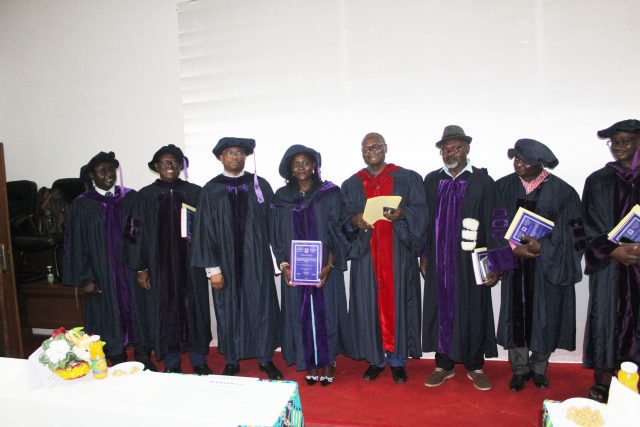
The candidate with the members of the jury
On Monday, November 28, 2022, Kouamo Mersimine PhD student at the Department of Biochemistry,University of Yaoundé 1 and research student at CRID presented her work entitled: “Genomic and functional characterization of the role of glutathione s-transferases epsilon in resistance to insecticides in the major malaria vector Anopheles funestus s.s.” in front of a jury comprising of experts in malaria research. After critical examination of the scientific nature of the work, the jury unanimously awarded her a doctorate degree in Biochemistry with distinction.
This research work was conducted under the supervision of Prof Fekam Boyom Fabrice, University of Yaoundé I, Prof Boudjeko Thadee, University of Yaoundé I and Prof Wondji Charles, Liverpool School of Tropical Medicine.
Research results
Results of this scientific work revealed that, the presence of several allelic variations increases the survival capacity of An. funestus in the presence of pyrethroid insecticides, DDT and insecticide treated nets such as PermaNet 3.0 and PermaNet 2.0 nets, but not the case with Olyset Plus nets which contains a synergist in addition to the insecticide. This study showed that overexpression of some enzymes linked to insecticide resistance, namely glutathione s-transferases epsilon GSTe1,2,3,4,5,6,7 and 8, as well as the presence of allelic variations in An. funestus, increases insecticide resistance and consequently reduces the efficacy of the main vector control tools used in Cameroon.
Recommendations
Based on results of this study, the candidate recommends firstly that, people should sleep under long-lasting insecticidal nets (LLINs) to reduce contact with mosquitoes. Secondly, the scientific community should develop rapid diagnostic tools for insecticide resistance based on the allelic variations D26G-GSTe3, H161Y-GSTe4, A189G-GSTe4, A169T-GSTe6 and G210E-GSTe6, which will allow rapid detection of resistance in the field.
Finally, public authorities should integrate the distribution of mosquito nets containing synergists such as PBO into vector control programes, and recommend the rotation of insecticides in the field to reduce resistance, as recommended by the WHO. These recommendations are more urgent because according to recent reports published by the World Health Organization (WHO), 241 million cases of malaria were recorded worldwide in 2020 with 627,000 deaths (WHO, 2021). Africa alone accounted for 95% of the global burden, with children under 5 and pregnant women being the main victims.
Dr Kouamo used the functional characterisation approach to show the role of glutathione s-transferases epsilon (GSTes) in insecticide resistance in Anopheles funestus.
Congratulations! Dr. Kouamo Mersimine for joining the rank of experts and doctors trained at CRID.






